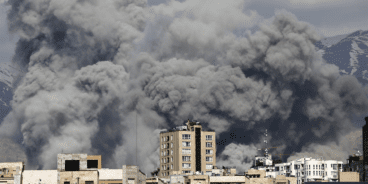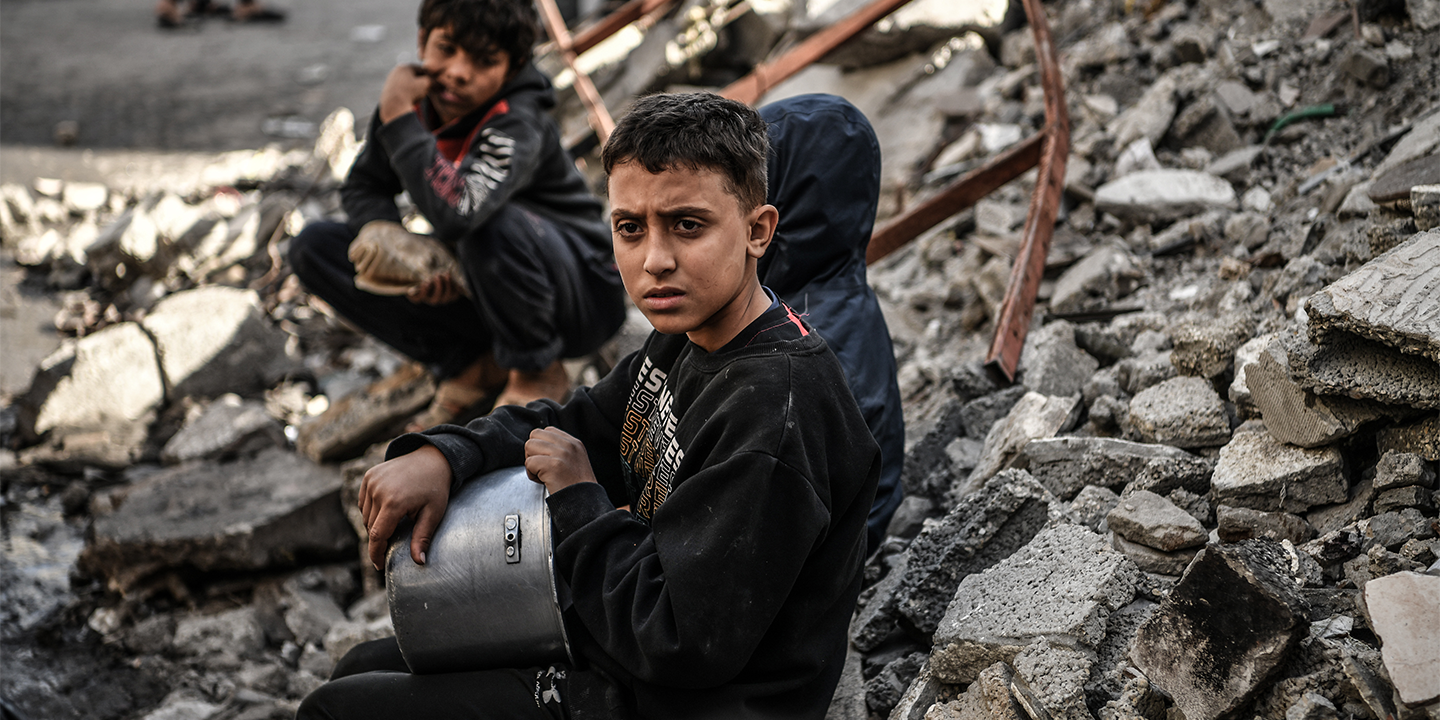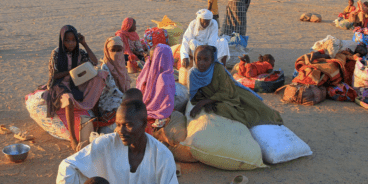

Atrocity Alert No. 377: Israel and the Occupied Palestinian Territory, Myanmar (Burma) and Ukraine
Atrocity Alert is a weekly publication by the Global Centre for the Responsibility to Protect highlighting situations where populations are at risk of, or are enduring, mass atrocity crimes.
PROCEEDINGS INITIATED AT ICJ UNDER GENOCIDE CONVENTION AS SUFFERING IN GAZA MOUNTS
On 29 December South Africa filed an application before the International Court of Justice (ICJ), instituting proceedings concerning alleged violations of Israel’s obligations under the Genocide Convention regarding Palestinians in Gaza. South Africa’s application to the ICJ specifies: “acts and omissions by Israel…are genocidal in character, as they are committed with the requisite specific intent…to destroy Palestinians in Gaza as part of the broader Palestinian national, racial and ethnical group.” The application also requested for the indication of provisional measures from the ICJ. Public hearings will be held from 11-12 January.
In recent weeks, heavy bombardments by Israel from air, land and sea, as well as ground battles, have continued to intensify across Gaza, with increasingly devastating consequences for civilians. Evacuation orders have been issued for 35 percent of the Gaza Strip since 1 December. Rafah now hosts over 1 million internally displaced people as a result of evacuation orders and the intensification of hostilities in Khan Younis and Deir al Balah, according to the UN Office for the Coordination of Humanitarian Affairs. Airstrikes and missiles regularly hit areas in middle and southern Gaza where displaced Palestinians were directed to seek safety following the Israeli military’s evacuation orders. Since 7 October over 23,200 Palestinians have been killed and more than 59,100 injured in Gaza.
Amid mass displacement and alarming statements by high-level Israeli officials on plans to transfer civilians from Gaza to third countries, fears have increased over mass deportation of Palestinians to Egypt. In response, UN High Commissioner for Human Rights Volker Türk emphasized, “International law prohibits forcible transfer of protected persons within or deportation from occupied territory.”
Meanwhile, the human-made humanitarian crisis in Gaza continues to worsen due to Israel’s siege. The Famine Review Committee has repeatedly warned that the risk of famine increases daily, while the World Health Organization has warned of an “imminent risk” of communicable disease outbreaks due to overcrowded shelters and lack of proper water sanitation and hygiene facilities. Critical shortages of fuel, water and basic medical supplies are exacerbating the suffering of Palestinians and severely curtailing the life-saving abilities of the few remaining operational hospitals in Gaza. UN Under-Secretary-General for Humanitarian Affairs Martin Griffiths warned, “the humanitarian community has been left with the impossible mission of supporting more than 2 million people, even as its own staff are being killed and displaced, as communication blackouts continue, as roads are damaged and convoys are shot at, and as commercial supplies vital to survival are almost non-existent.”
A cessation of hostilities and full, unimpeded access for humanitarian aid are imperative to halt the suffering in Gaza and eliminate the risk of famine and disease outbreaks. States parties to the Genocide Convention should stand in solidarity with civilians in Gaza and support proceedings before the ICJ. Third party states and other members of the international community must refrain from attempts to impede the work of the ICJ and discredit the merits of the dispute.
NEW REPORTS DOCUMENT FURTHER EVIDENCE OF ATROCITIES AMID OFFENSIVES IN MYANMAR
On 27 October a group of ethnic armed resistance organizations in Myanmar (Burma) – known as the Three Brotherhood Alliance – launched a campaign against the ruling military junta. Since the launch of so-called “Operation 1027” fighting has spread across the country, with ethnic armed groups taking over hundreds of military posts and some major cities amidst retaliation from junta forces. Despite attempts by neighboring China to negotiate a ceasefire, the hostilities have escalated, including fighting for control of Laukkaing, a major city along the Chinese border that was seized on 4 January by the Three Brotherhood Alliance. On 7 January the junta bombarded a village in Sagaing Region, killing 17 civilians, including 9 children.
As of 15 December, over 660,000 people have been displaced by the fighting and at least 378 killed. Indiscriminate attacks on civilians, including airstrikes and the use of internationally banned cluster munitions, as well as arbitrary detentions, use of child soldiers and forced conscriptions, are violations of international law and may amount to war crimes.
On 21 December Amnesty International and Human Rights Watch independently published two new reports documenting violations and abuses against civilians amidst the ongoing operation.
Amnesty International documented increasing atrocities committed by the military as the junta struggles to quell armed resistance. In Rakhine State, civilians have faced indiscriminate attacks, arbitrary detentions and looting. Among the incidents documented by Amnesty was an attack on 16 November by the military on Pauktaw township. More than 100 civilians sheltering at the Lawka Hteik Pan compound in Pauktaw were forced to stay outside in heavy rain, some with their hands tied behind their backs. The following day, soldiers locked the victims inside a temple and denied them food and water for two days. When other civilians were discovered hiding, soldiers threatened to kill them. The report also documented military use of banned cluster munitions in Shan State.
Meanwhile, Human Rights Watch detailed abuses by the Myanmar National Democratic Alliance Army (MNDAA), an ethnic Kokang armed group and member of the Three Brotherhood Alliance. According to the report, MNDAA abducted and forcibly recruited civilians fleeing fighting in Shan State between 24 November and 5 December. In a video verified by Human Rights Watch, the group urged villagers to not shirk their responsibilities and to ensure those recruited were between ages 15 and 50. The MNDAA officials also threatened families, saying they would come to arrest those who did not serve.
Jaclyn Streitfeld-Hall, Director of Policy and Research at the Global Centre for the Responsibility to Protect, said, “Widening abuses perpetrated since the launch of Operation 1027 highlight the acute need for a rapid international response to the situation in Myanmar. Nearly three years since the February 2021 military coup, we urge more state to join efforts to impose sanctions on jet fuel and the corporations tied to the junta in order to strip the military of its capacity to perpetrate unrelenting atrocities.”
RUSSIAN FORCES LAUNCH NEW DEADLY WAVE OF AERIAL ASSAULTS ON CIVILIANS IN UKRAINE
Since 29 December at least 120 civilians have been killed and nearly 480 injured in relentless Russian airstrikes across Ukraine. During an 18-hour onslaught on 29 December, Russian forces launched the largest aerial attack on Ukraine since the conflict began, with cruise and ballistic missiles striking cities across the country, killing at least 40 people and injuring 160 others. Following strikes in the capital, Kyiv, a survivor recounted, “It was so frightening. A missile was flying and everything was buzzing, whirring. I didn’t know what to do.” The series of strikes also targeted Ukraine’s second largest city, Kharkiv, damaging critical infrastructure and resulting in civilian casualties. In Dnipro, missiles hit a shopping center and maternity hospital, killing at least six people, including a child.
Speaking on the unrelenting and deadly attacks, on 2 January the UN Resident Humanitarian Coordinator for Ukraine, Denise Brown, said, “For the people of Ukraine, the new year started with loss, pain, and anguish. For the third day in row, vast aerial assaults by the Russian Federation have caused death – including several children – and destruction of homes and other civilian infrastructure.”
Coordinator Brown also raised alarm regarding many parts of Kyiv that have been left without electricity or water, which is particularly dangerous as winter temperatures drop to -20 degrees Celsius. Ongoing hostilities in Donetsk have also left hundreds of thousands of people without power. Russian attacks have routinely targeted Ukraine’s power and water infrastructure, deepening the humanitarian crisis for millions across the country as hostilities since the February 2022 escalation have already left 17.6 million in need of humanitarian assistance. Indiscriminate attacks against civilians and civilian infrastructure are prohibited under international law and may amount to war crimes.
With the somber second anniversary of the conflict looming next month, the international community continues to struggle to find pathways to protect civilians in Ukraine. According to the UN Human Rights Monitoring Mission in Ukraine, the fighting has killed more than 10,000 civilians since February 2022, with the real toll significantly higher. Sarah Hunter, Ukraine expert at the Global Centre for the Responsibility to Protect, said, “The international community must reinvigorate efforts to address the conflict and critically revisit loopholes in sanctions to cut off access to the materials, weapons and funds that Russia utilizes to perpetuate wanton death and destruction in Ukraine.”
Related Content


Atrocity Alert No. 471: Sudan, Israel and the Occupied Palestinian Territory and Burkina Faso
